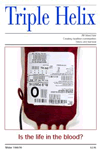Do gays die younger?
Developing controversial earlier work, Cameron et al have 'examined four different contemporary databases for evidence that homosexual activity might be associated with a shortened lifespan'. Their conclusions from data from the USA, Scandinavia and the UK lead them to confirm 'a lifespan shortened by 20 to 30 years' and they comment 'the personal and public health implications are considerable'. (Source: Psychological Reports, 1998; 83: 847-866)
Has serial killer Kevorkian finally gone too far?
On CBS news programme 60 Minutes millions of Americans watched a tape of Jack Kevorkian giving a lethal injection to a 52 year old man with motor neuron disease. Thrice acquitted previously on charges of assisting suicide (where his tally exceeds 120), Michigan prosecutors are now considering whether he should face a murder charge. The militant campaigner promised on television that if convicted he would starve himself to death in prison. (Sources: The Times, The Independent, 24 November 1998 and Chicago Tribune reported in The Independent 26 November 1998)
Patter of tiny hooves
On 12th November a US biotech company announced that three years earlier it had created a human-cow hybrid by fusing the nucleus of a human cell from one of its own scientists with an egg cell taken from a cow. After 51 earlier failures this hybrid developed to the stage of a 32-cell embryo. A cartoon accompanying the newspaper report showed a newly expectant mother announcing: 'Darling, we're going to be hearing the patter of tiny hooves'. (Source: The Independent, 13 November 1998)
Altruism on the way out?
Religious fears about receiving blood are featured elsewhere in this edition, but the UK's National Blood Authority fears there may not be enough blood to go round anyway. With demand rising at 3- 4% per year, research into supply found that altruism is slowly declining as a feature of British society. The number giving to charity is falling as is the proportion of people doing voluntary work, yet Jesus said 'It is more blessed to give than to receive'. (Sources: British Medical Journal, 21 November 1998; 317: 1405 and Acts 20: 35)
The Pill for men
MRC trials in Manchester are investigating whether a combination of 4-monthly testosterone implants with a daily oral prolactin inhibitor could be an effective contraceptive for 'new-millennium man'. The problems ahead are not only pharmacological: 'Joanne, 42, married with two children' comments 'Tell a man to get something out of the freezer and he forgets. No way would I rely on him to remember a pill.' (Source: The Independent, 3 November 1998)
Jabs against babies: Indian women protest
Women's health group activists protesting outside the opening of the 10th international congress of immunology in New Delhi in November described immunological routes to contraception as 'scientifically unsound and inherently unsafe'. Six contraceptive vaccines all intended to produce antibodies against reproductive hormones have reached phase 1 clinical trials in different countries. (Source: British Medical Journal, 14 November 1998; 317: 1340)
Fewer teenagers in the USA are having sex
Perhaps all this contraceptive creativity may become less necessary in the next millennium anyway? The US Centers for Disease Control and Prevention report that the percentage of American teenagers (especially boys) who have had intercourse has declined in the 1990s. (Morbidity and Mortality Weekly Report, 1998; 47: 749-752)
Time chiropractic took its hands off?
A large long term study compared patients receiving chiropractic for back pain with a group receiving conventional physiotherapy and a group who just received a booklet about coping. After two years there was no difference between the groups. (Source: New England Journal of Medicine, 1998; 339: 1021-1029) In the same issue, a second study funded by chiropractic groups found no evidence that spinal manipulation could ease asthma symptoms in children. (Source: New England Journal of Medicine, 1998; 339: 1013-1019)
Glen Hoddle's faith healer
Christians (and football fans?) aren't the only ones worried by England coach Glen Hoddle's appointment of a New Age healer to the squad. An editorial in a medical journal argues about the risks of this development in sport, particularly where children are concerned. (Source: British Journal of Sports Medicine, 1998; 32: 195)
Stress . . and nurses . .
Seeking explanations for examples of falling standards in nursing, Professor Hugh McKenna writes 'low numbers of registered nurses lead to poor quality of care, which leads to high stress and low morale; this in turn leads to high sickness rates, a shortage of nurses, and poor quality of care'. (Source: British Medical Journal, 21 November 1998; 317: 1403-1404)
. . and GPs
In a study of 131 GPs investigating 'individual and organizational predictors of depression', doyen of doctor stress Jenny Firth-Cozens found that 'relationships with senior doctors and patients are the main reported stressors, followed by making mistakes and conflict of career with personal life'. (Source: British Journal of General Practice, 1998; 48:1847-1851)
An oldfashioned miracle
This title in the occasional BMJ series 'A memorable patient' caught the eye. Consultant anaesthetist Dr T Kirkpatrick describes a patient who had a cardiac arrest one Good Friday. There was concern he had sustained serious hypoxic brain damage but by Easter Sunday 'he seemed to be neurologically intact'. His wife 'had spent all night at a prayer vigil and was convinced that his recovery would be complete. Since then, I have seen several recoveries on the intensive care unit which could be described as miraculous, but none with such wonderful timing.' (Source: British Medical Journal, 17 October 1998; 317:1053)































